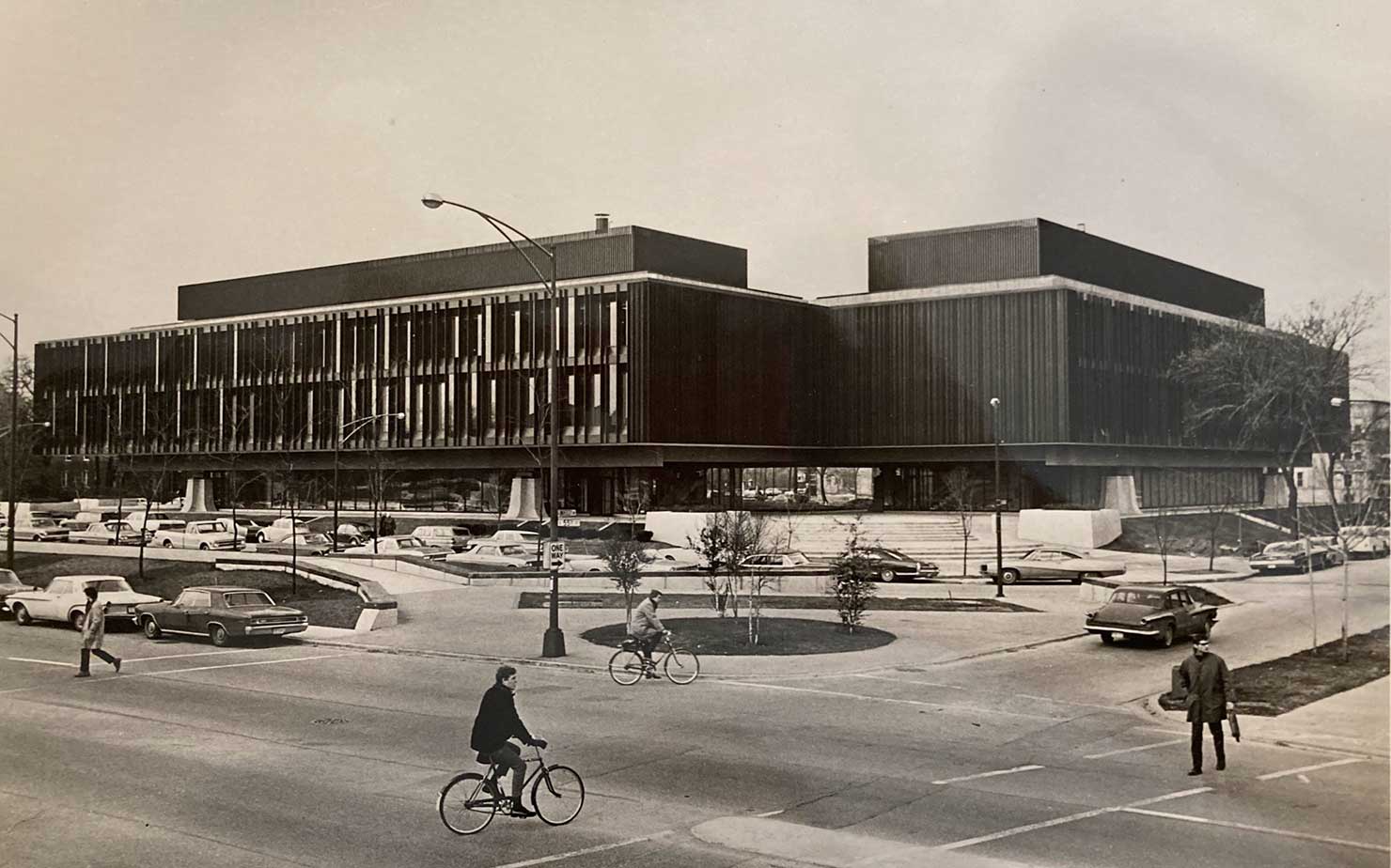
Reflections from the Past
As we transition to our new location, we’ve been thinking about the wonderful times shared together at LSTC. Through conversations, events, and stories, we are reflecting on the past to make meaning of the lessons learned as we gear-up for the next thrilling stage of our life together as a seminary.
Watch the video: “LSTC: A Seminary in Motion”
Take a Virtual Tour of the Building
READ Letters and Stories from LSTC Faculty, Staff, And Alumni
Nancy Schroeder | Blair, NE
My husband, Joel, attended [LSTC from] 1975-79 and we have strong memories of shared housing with Jesuits and McCormick friends. [During that time,] our hardworking LSTC custodian, Nick Spehar, engaged all of us with his good humor and stories, and Sadie Washington was a wonderful secretary.
We all acclimated to urban Hyde Park after a rural Nebraska background but eventually we got used to the whistle system, Chicago cops, and walking in groups at night! We discovered the joys of Rockefeller Chapel concerts and Maury’s Deli polish dogs and fries for 59 cents. The professors and friends we grew to treasure gave us wonderful memories all these years later.
Some highlights were our campus production of Godspell, our cooperative potluck dinners and fellowship of new friends, our field trips to various teaching parishes, and our discovery of the melting pot that is Chicago cuisine from Chinese to Greek. The most vivid memory of our LSTC graduation day in May 1979 was that it was a brilliant sunny, breezy joyful day.
Soli Deo Gloria
Rev. Joe C. Wold | Bew Braunfels, TX
I graduated from LSTC in 1959. My wife Arlene H. Wold attended LSTC in my senior year and then we both stayed on at the School of Missions. Those were the days when the ELCA was discussing the possibility of ordaining women.
[Some of my most prominent memories include:}
The story of Dr. Forell’s answer when asked, “Who got the highest score on the Theology test?” “A woman!” was repeated a hundred times and pretty well put an end to the argument of some conservative pastors that “…a women will not know all the things a pastor should know.” That woman was my wife, Arlene.
Some of our fellow students, who perhaps were used to getting the top score on exams said, “Oh, now Joe will have a wife who can write his sermons for him.” That was so far from the truth that Arlene and I hardly laughed at it. But her studies helped her understand the ministry and mission we had those fifteen years in Liberia and our ten years in Peru. I never lacked an informed person to talk to about any challenges or new opportunities that presented themselves in our ministry. Arlene’s perfect score on Dr. Forell’s theology test was no surprise to me.
[I also fondly remember] the year we were in the Virgin Islands, [when] Dr. Sittler was one of the main speakers at the World Council of Churches Conference in India. World Church leaders who attended were well impressed by his lectures. The Lutheran School of Theology at Chicago became world famous because it was the seminary where ‘World Famous Joseph Sittler’, was the resident theologian.
Pr. Daniel J. Carlson | Orange City, FL
Having been raised in a congregation of the Augustana Lutheran Church and beginning my theological studies when that church body’s seminary in Rock Island, IL, was still identified by the name Augustana, nothing symbolizes more the continuing transitions among Lutherans in this country than my graduation certificate. Its top line reads: Lutheran School of Theology; and the bottom line: Given at Rock Island, in the State of Illinois. May 21, 1965.
While the mergers forming both the Lutheran Church in America, and later, the Lutheran School of Theology at Chicago had taken place, in mid-’65 a campus for the latter had yet to be established. Now, nearly, and merely, some 60 years later and in terms of transition, history repeats itself.
Personally, I am grateful for having resided, consistently, in New England for 50 years and for 41 of those years having been under call – four successive calls from congregations, a fifth and final call from the ELCA as a regional gift planner.
Might this practice, this history of transitions be, in part, the Spirit’s intentional preparatory exercises for our graduation, our ultimate transition from planet earth’s demanding and instructive lessons to the ultimate reality of life in the heavenly realm?
Time will tell. Or, as mother used to say, we’ll see.
Mattie Penn

I came to LSTC in the Summer of 1976 as Secretary to the Dean of Students. While there, I experienced many firsts, especially for women. I believe LSTC was one of the first Lutheran seminaries to be inclusive of women faculty, women students, second-career students, and, last but not least, African American students. LSTC embraced these new beginnings and, as a result, students came from far and near to study. Our office, under the leadership of Rev. Jean Bozeman (one of the firsts herself) nurtured new students in the “big city,” provided information for employment, and [assisted with] financial aid.
Later, I transitioned to the Office of Administration under the leadership of Joseph Rodrick, VP for Administration and Finance. Again, another wonderful experience.
LSTC was a special and wonderful place to work. It was a pleasure to walk through the doors each day. It was more like seeing family and friends in a worshipful setting every day.
Bill Carter | Avon, CT

I began at LSTC in the fall of 1967, a member of the first class to begin their journey to Ordained Ministry at the new campus in Chicago. The Lutheran School of Theology at Chicago. The dream of Dr Robert Marshall. While a senior at college, I’d had a phone call of invitation at my home in Brooklyn, New York, from Ted Conrad, the new Dean of Students. I accepted his invitation to “join the first class to begin their studies in Chicago.”
It was a glorious time celebrating the merger, being in the midst of a wonderful faculty just finding their way as colleagues and Middlers and Seniors from the 5 predecessor campuses. Looking back, I admire the way those folks welcomed us and shaped something special from unexpected change. The building was exciting, still a few items on the punch list as we began. (I still have a pair of oak bookends – detritus from trimming the bannisters in the stairwells…)
We lived in apartments and ate (and worked) at the refectory and loved the chapel and the library. All new. And it became perfect as we learned and worshipped together. The faculty was extraordinary. They reached back to the depths of theology and caring and showed us newness and a faith for ever-changing present and for the future. I learned the phrase “My teacher’s teacher…” with a cadence of respect. In the midst of riots and assassinations and a war, we became a community of faith.
I offer prayers as the next chapter plays out in Chicago. May the power of the Holy Spirit, the strength of teachers and teacher’s teachers, and the fellowship of classmates continue to inspire and undergird the tasks of theological education for generations to come. May the windy city know the Spirit’s refreshment and strength. Amen.
Meta George | Columbia, MO
In 1997, the Joseph Andrew Sittler, Jr., Archive was established at LSTC. Dr. Sittler (1904-87) was a parish pastor, theologian, preacher, and teacher who was on the faculty at the Lutheran Theological School in Maywood, Il., a Professor of Theology at the Federated Faculty at the University of Chicago, and Distinguished Professor in Residence at LSTC. He was a friend and mentor to many.
Contained in the archive are works by and about Sittler: books, articles, correspondence, photographs, as well as audio and video tapes of his sermons, lectures, speeches and conversations, with summaries of each tape included. The archive was created to be a resource for the seminary and for the wider Church.
Pr. Robert Walters | Clarkson, MI
I studied at Chicago Lutheran Theological Seminary at Maywood from 1957-61, at the time Maywood, Augusta, Suomi, and Grandview Seminaries merged. Early in the process, Suomi and Grandview professors came to Maywood, including Walter Kukkonen and Karl Kelly.
I fondly remember Old Testament Prof Robert Marshall making the Old Testament come alive, accompanied with his ever-present box of tissues next to his lecture stand. I assume he had allergies. Prof H. Grady Davis, homiletics, always taught and preached on his tiptoes since he was very short in stature. Dr. Arthur Voobus was our scholarly New Testament Prof, soft-spoken and exceedingly kind, even when I really didn’t care about the north/south Galatian hypothesis. Each fall there was a campus-wide clean up, and Dr. Voobus came out to rake, dressed in his usual suit and tie.
On December 18, 1961, the Eisenhower Expressway was finally finished, right down the hill from the seminary on 11th Avenue. The day before the campus was quiet as usual with the study and sleeping undisturbed. The day after, the continuous traffic roar began. I didn’t sleep well that night, but by the next night got used to its ubiquitous presence.
I earned my Doctor of Ministry degree from LSTC in 1981 with other members of our Michigan Synod (LCA) group. That was a special time in my ministry at Calvary Lutheran Church in Clarkson, which included a horizon project of a month in the Holy Land studying with Dr. Bruce Stein.
For years afterward, fellow student and great friend Pastor John Siefken and I drove to LSTC every January for a week to prepare for Lent. Daily worship with the seminary community and visiting with professors and friends made the time more special and often included events at nearby U of Chicago. On the evening of January 26, 1986, we drove into Chicago to find the city virtually deserted. The Chicago Bears were playing in the Super Bowl, and everyone was staying home to watch the game on television!
Jerome Nilssen | North Hollywood, CA
At the age of 11—during those pivotal years of the split within the LCMS—I chose LSTC as the seminary of my theological dreams. I arrived, eleven years later, eager to study theology and contribute my trumpet playing to the seminary music scene—wherever Lutherans gather, the music is always impressive, particularly when the organ is played by Paul Manz. There, in the seminary chapel, I decided I would go to graduate school. [The rest, as they say, is history].
Rev. Dr. Richard “Rick” J. Meier
In the fall of 1968, a large first-year junior class of 83 men, no women, began our studies at LSTC. We were the second group to begin in Chicago, after the merger of five seminaries in the region came together to build the beautiful new building at 1100 E. 55th St. I had just graduated from Augustana College, Rock Island, as had many of my classmates beginning seminary.
It was a very tumultuous time in Chicago. The Democratic National Convention was in process, there were countless demonstrations against the Vietnam war, and the infamous Chicago Seven trial was taking place. Even at the seminary there was unrest and continuing attempts to adapt the curriculum to current needs and trends. Professors from the five merging seminaries were learning to work together. And several of my classmates were vocal about coming to seminary not necessarily because of God’s call, but because it was a way to avoid the draft.
Over the course of the next four years several of my classmates dropped out for various reasons. Some realized they were not called to ministry and chose other career paths. Others found themselves to be theologically unfit for leadership in the Lutheran Church. At any rate, our graduation photo, which resides on a seminary hallway wall, shows 37 of us in the class of 1972. I’ll always remember the sermon given at graduation by Dr. G. Everett Arden, who looked upon the class about to enter the real world and proclaimed in his own inimitable voice, “The disciples Jesus chose and called were a very motley crew; and he’s still doing the same thing today!”
One of the wonderful things that happened during the seminary years was that many of us met our future wives. In my case and that of several others, we formed a social group, irreverently called the “Fallen Friars.” Through the contacts of a classmate who worked at a local hospital, female nursing students were invited to parties at the “Manse,” where many of us lived. While we never revealed exactly what transpired at these “parties,” I met my wife Helen, to whom I’ve been married for 53 years! I believe ours was one of eight marriages that resulted from these social events during our Middler year.
I have no idea how many of my classmates spent their whole career in ministry. However, mine was blessed with 50 years of service to the Church as pastor and missionary, having served the Lutheran Church in California, Minnesota, Argentina, Florida, and Illinois. I am grateful to LSTC for affirming my call from God and launching me into a career that has blessed my life, my family, and those whose lives I’ve been fortunate to touch. Even with its move to a new location, I pray that LSTC’s influence will continue to guide and inspire those whose call is to serve Christ’s Church for the next many generations!
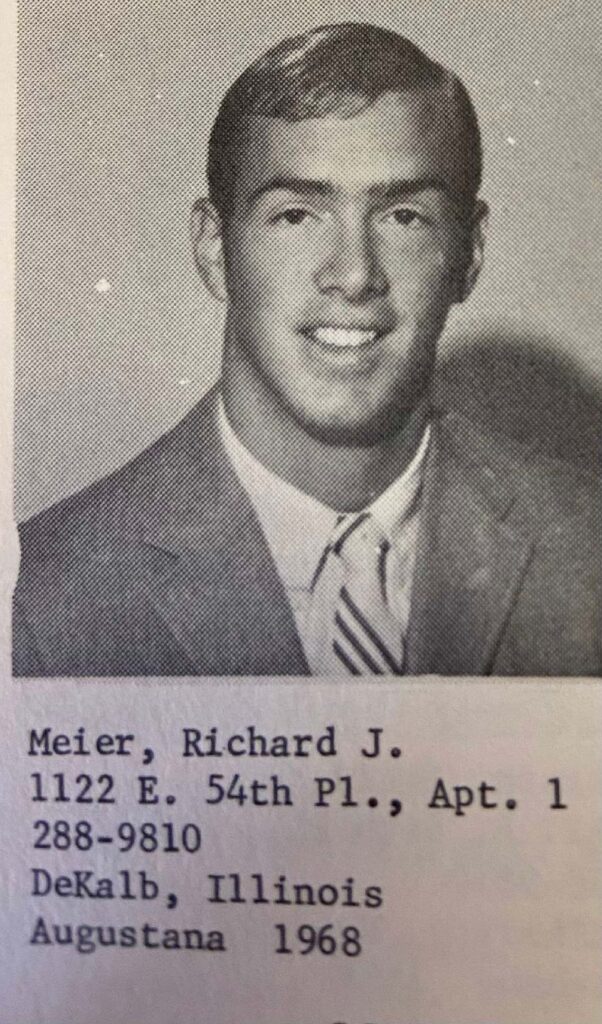
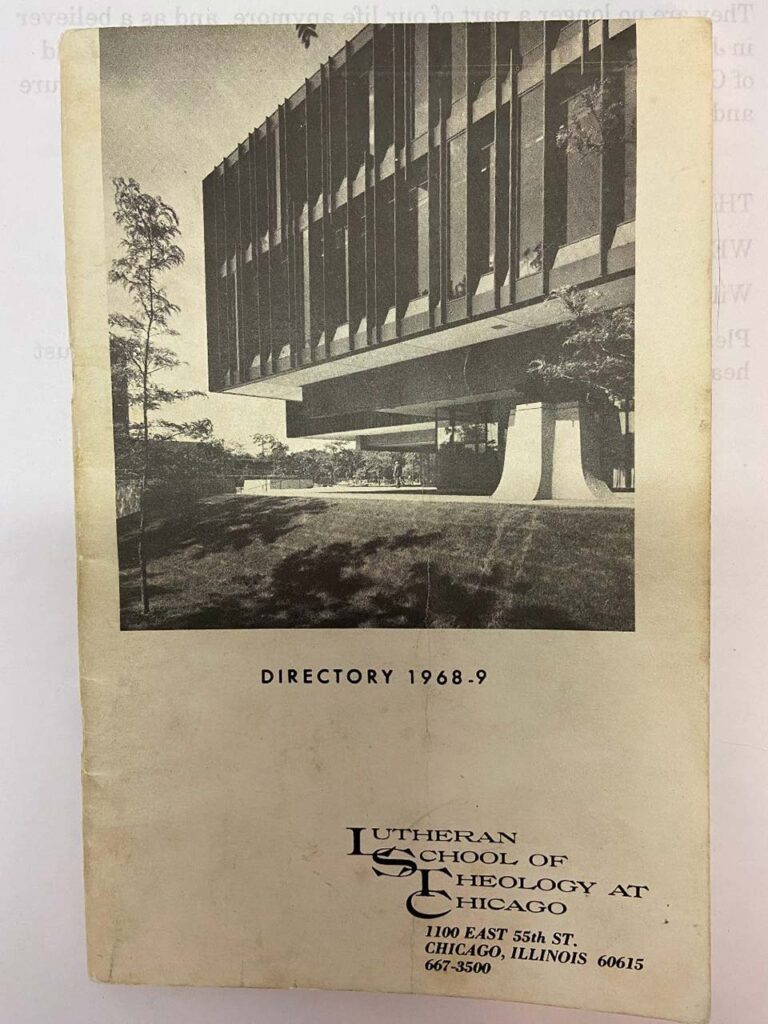
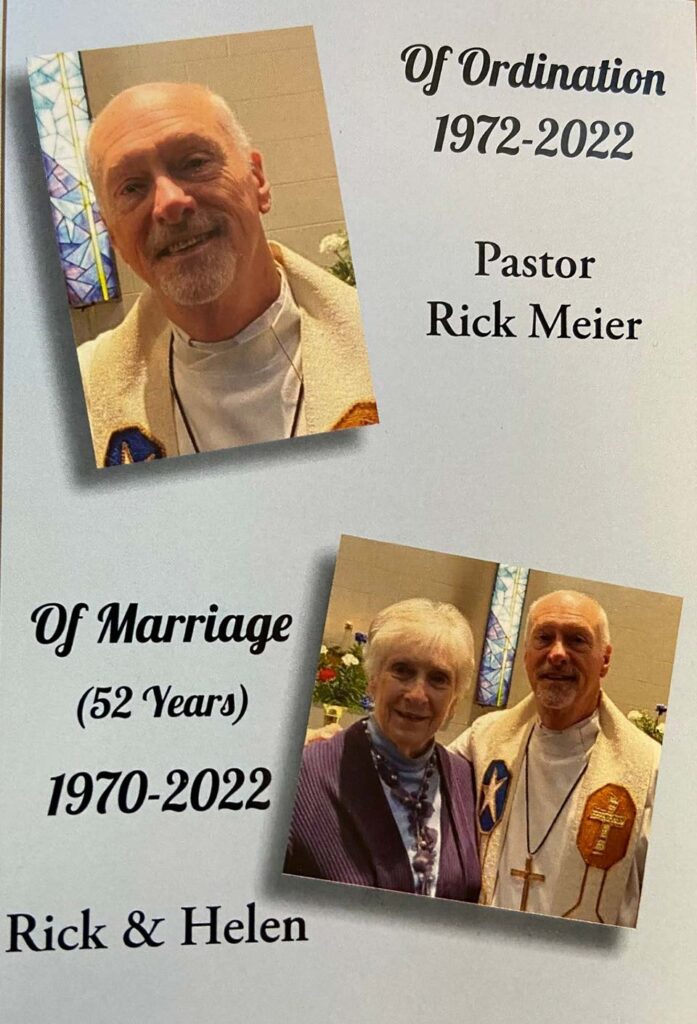
Nelvin Vos, Professor Emeritus of English, Muhlenberg College | Allentown, PA
One of the unique features of the LTSC building is the wall of windows facing 55th St. The curtains in the chapel were usually closed but not always. At this service in the 1969 summer session, the audience had a clear view of the outside world. I was serving as Visiting Professor of Religion and Literature that summer.
A man walking on 55th St. peered in a parked car, stopped, looked around to see if he were observed, suddenly placed a device in the car door, opened the door, grabbed a parcel on the front seat, and quickly ran off. After a moment of surprise and shock in the audience, several men scurried out and we saw them running rapidly after the thief and caught him. I don’t know if they told the burglar that a large number of people had been witnesses of his crime.
Andy Ballentine
I had the privilege of helping [theologian] Joe Sittler plant the first trees in the courtyard. Joe explained how he wanted the trees to be arranged. His eyesight was not good, so he trusted us to carry out his idea. I remember that he stuck his umbrella in the ground and put his pork pie hat on top, to mark the first corner of the design.
[The photo below] is of the “New Christy Ministers,” performing at the Feast of Fools talent show in 1979. Pictured are (left to right) Andy Ballentine (’79), seminarian spouses Diane Meisenbach and Patty Ballentine, Janet Christian White (’79), and James Worthington (’79). Partially hidden — you can see his washboard — is seminarian Peter Meisenbach.

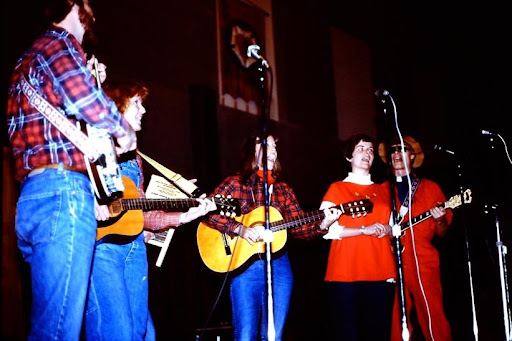
John Mohr | Richfield, MN
While working at McCormick [as the former Vice President for Development] in helping complete a comprehensive campaign in the early 2000’s, I had the good fortune to be a part of two welcoming, important institutions. Even before the completion of McCormick’s new building, those of us on its alumni and development staff worked at LSTC (an office suite at end of the second floor, northeast end).
The accommodations were comfortable, and the hospitality and friendship of our hosts always appreciated. I remain grateful for my time in Hyde Park and those with whom I worked in our shared facilities.
All the best to the current LSTC community in its new teaching and administrative home. I look forward to following your seminary’s continuing endeavors and to visiting the new quarters some time on a Chicago trip.
Rev. Sue Ellen and Rev. Richard Grudt
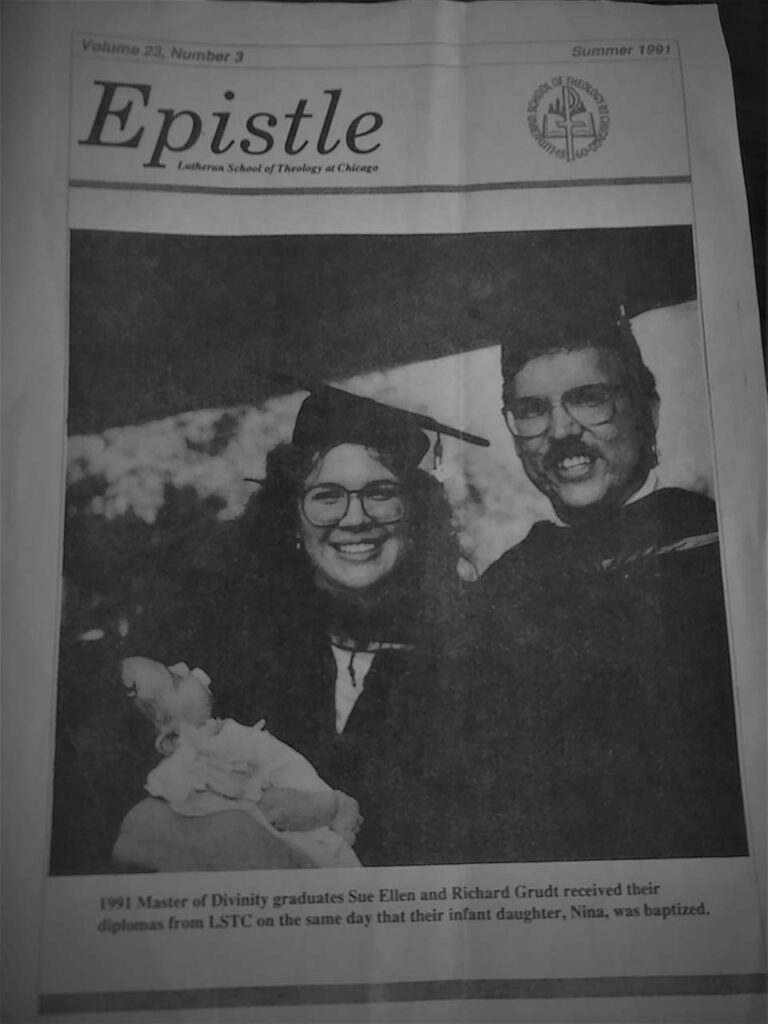
Volume 23, Number 3: Summer 1991 was a very special issue for us as we and our new born baby daughter, Nina Ellen Grudt, were featured on the cover: Nina was baptized that same day we graduated from LSTC with our M.Div degrees.
Since that celebration over 30 years ago we’ve been blessed to serve as ordained pastors at a combined 9 churches in 3 states, and welcomed two more children-our wonderful boys, Benjamin and Joseph.
Our daughter Nina, pictured there, graduated from Carthage College (ELCA) with her secondary teaching certificate, then loving serving the ELCA for 2 years in Global Missions teaching at EGT in central Slovakia. She is now married with two little boys of her own and teaches in Brookfield, Wisconsin.
Rev. William J. Preuss II, retired | MDiv 1972
Newly married, second-hand car, items to furnish our apartment in a U-Haul…so began our journey from Connecticut to Chicago and LSTC in July 1968. We had lived our lives up to this time in the Northeast. A time for a new journey and a great transition!
LSTC was still an infant in a new location. A seminary with deep roots but doing something new. As we moved into our third floor apartment we met other students and family members. The soon to occur riots associated with the Democrat Convention caused our parents to question the wisdom of moving to Chicago. We knew immediately that this was the place we needed to be.
The LSTC educational program soon began. We became acquainted with Hyde Park and job searches commenced. Marilyn, drawing on her graduation as a nurse, soon found herself working at Michael Reese Hospital. I found a parttime job with the help of LSTC at Breslauer’s Department Store in Hyde Park.
We became immersed in life as a first year seminarian family and in the community. LSTC provided me with fantastic educational opportunities. LSTC through the teaching parish also provided me with additional community engagement. We became deeply involved with Christ the Mediator parish on the near south side of the city, and remained there well beyond the teaching parish requirement.
For us LSTC provided through education and community involvement a foundation for a future in the parish and in social ministry organizations. Time spent at Augustana Lutheran Home as part of the LSTC program introduced me to ministry with the aging and the mission that would become the second half of my pre-retirement ministry. Internship, and a second year with this parish, provided me with skills needed for parish ministry and the experience of preaching and leading worship with LSTC faculty and staff in the congregation.
Transitions occur throughout life, individually and institutionally. This I know very well, and LSTC helped prepare me for this reality. LSTC is once again in a time of transition just as it was 55 years ago when we arrived in Chicago. I am thankful for LSTC’s leaders (including President Neiman who I was fortunate to know when we were both in Connecticut) who are guiding this time of transition, seeking to immerse all stakeholders in the process of transition.
Will we miss the “old” campus that was so “new” in 1968, absolutely. However we rejoice in the new opportunities that will continue to reveal themselves in a time of transition for LSTC once again.
Carol P. Pauluhn
Thanks be to God for Christ Seminary Seminex and the late Rev. Dr. Herman F. Neunaber, bishop of the Great Rivers Synod AELC. Through the efforts of Dr. Neunaber my late husband Cuthbert “Bert” Pauluhn was rerostered with the AELC, the ALC, and then the ELCA. Bert knew when he was twelve years old that “the greatest thing I could do was to be a pastor and tell people about Jesus Christ.” He served as a parish pastor until his retirement in July 2013 the 60th anniversary of his ordination in July 1953. We are because Christ is!
Michael Klinefelter, ELCA Regional Gift Planner | Iowa
I have to be honest with you, I was less than thrilled with the idea of LSTC moving. But the more I thought about it from a strategic perspective, it makes all the sense in the world. I raised money for that chapel, and I take it personally. I was there for the first song played on the organ once it was put together (but not yet tuned): A Mighty Fortress, which seemed like the proper hymn. But it’s hard to say goodbye. Then I remembered how hard we worked during the Equipping the Saints for Ministry campaign to raise funds for the physical plant; we were not very successful. And the work Bob Berridge and his team did to understand the depth of the deferred maintenance was incredible; and that was 20 years ago!
I just opened the LSTC letter from you with the brochure and move details. As it turns out, this is a brilliant move. Stay in Hyde Park – the cluster is still functioning, I hope. CTU was a great partner when I first worked for Kadi Billman in the Dean’s Office in 1999. I’ve heard it said we get along better with the Catholics than we do with the LC-MS, which I believe. The only organization you could have sold to was the University. I hope they have plans that keep the building intact. But the deferred maintenance is now their responsibility. It was those broken windows we spent so much time on, I remember. Weather seals broken, cracks, probably even a bullet hole or two.
As I sit here in Des Moines as the ELCA Foundation regional gift planner in Iowa, still part of the LSTC team in that sense, I am deeply grateful for your leadership and that of the board. This is yet another visionary move by LSTC – moving to Hyde Park was the first, or maybe second – and I am deeply proud to have played a role in helping alumni/ae and donors make gifts to LSTC during my tenure from 1999-2009. Theological education has changed a lot, but our church, rightly, still requires an educated cadre of leaders.
Finally, the letter states that today’s organizations “seek leaders trained in strategic planning, nonprofit finance, and organizational change.” The Damm Chair sounds like a game-changer; I see too many pastors in Iowa who cannot read a budget, don’t know anything about HR, and to my way of thinking are committing pastoral malpractice by not knowing the giving history of parishioners. Money and management have to be taught at seminary; first call is too late, and it ingrains bad ideas into people. I’ll leave the particulars to you and the faculty at LSTC.
I will always consider LSTC to be my seminary. I deeply love Hyde Park and my time there. I hope you can get some rest this summer before the move. I imagine the last year has been busy and stressful. Thank you for your leadership.
Theodore N. (Ted) Swanson | Augustana ’54
Early in the fall of 1961, when I had just joined the faculty of Augustana Seminary, there was a meeting of the faculties of Rock Island and Maywood at White Pines State Park near Mt. Morris, IL, for the purpose of getting acquainted, and discussing the merger into the proposed Lutheran School of Theology at Chicago. One memory I have of that meeting is that Bob Marshall, then Professor of Old Testament at Maywood (soon to be voted first President of the Illinois Synod of the new LCA), had a lot to say.
We had a couple other such meetings in the coming months. One, at a former motel which had been turned into a Jesuit House, ended on a Saturday afternoon. The Augustana faculty went looking for their afternoon cup of coffee; some members of the Maywood faculty were asking where the bar was. This was an indication that there were some cultural differences to be overcome.
My own acquaintance with the new Chicago campus of LSTC did not occur in 1967, when all five merging seminaries came together in the new building. I, with wife and four children, was on leave at Vanderbilt University, Nashville, finishing my Ph.D., with two years of a three-year term remaining when I returned in the fall of 1968. Warned by President Stewart Herman that as the most junior of several teachers of Old Testament, not to buy but to rent when we returned to Chicago, I went to Dean Dale Lund with a proposal: would it be possible to teach half-time (and get half salary) in the ’68-’69 academic year, so the family could stay in Nashville and I get free time to finish my dissertation? He agreed. I taught the crash Hebrew course in September, came back for the spring quarter, and also taught summer school. My memory of the new building is the day-long lag in temperature change: how cold the AC continued when the weather turned cold; how warm it stayed when the weather grew hot.
During that spring quarter, Dr. Ted Bachman, Director of Theological Education for the LCA, cued by Dean Lund as to our situation, met me one day at lunch in the refectory, and told me of the United Theological College of The West Indies in Kingston, Jamaica, who were looking for someone to be Lutheran tutor and to teach Old Testament. Was I interested? I went home to Nashville that weekend to attend son Mark’s confirmation. An issue of The National Geographic had just arrived containing an article on Jamaica. We read it and said, “Yes, let’s go there.” (That’s all the orientation we ever got!) And that began a twenty-five year career in Global Mission, first in Jamaica and then in another United Theological College in Bangalore, India (with a semester in each of five years in Egypt thrown in after retirement). Dean Lund once wrote that one of the heavy responsibilities of his deanship was finding places for the surplus faculty that occurred with the merging of five institutions. Shortly before his death I had the opportunity to speak with him personally to thank him for his part in setting us on this new and fulfilling adventure in God’s wider vineyard.
Rev. Ronald W. Roschke | Denver, CO
Dear President Nieman and the LSTC community—
I want to write to you as you prepare for the important transition of closing the facility on 55th Street and make the move to your new home at the Catholic Theological Union. I wish I could be with you in person to celebrate those important events, but I have other commitments that week to which I am obligated. However, I want you to know I will be thinking of you all as these milestones are observed.
I am grateful for the mission of LSTC on so many levels. In 1974, as a graduate of the first class out of Concordia Seminary in Exile, I received a Master of Divinity diploma from LSTC, even though I had never taken a class there. The faculty’s and administration’s support of those of us who became stranded, due to a commitment to the Gospel in the midst of theological battles, showed both the heart and the courage of the seminary. I am proud of that diploma and thankful for our partnership in the Gospel. The building on 55th Street in Hyde Park became a spiritual home not only for students but for many of my teachers and mentors who were eventually welcomed into the LSTC faculty and invited to continue their valuable ministries.
After I found a home in the LCA, my connections with LSTC deepened and my spiritual roots were nourished. I served on the Board of Directors of the seminary from 1985 to 1993. These were exciting and demanding times for the seminary, and I am grateful for the ways LSTC rose to the many challenges. I was privileged to be part of LSTC’s journey into the formation of the ELCA, and I valued the seminary’s championing of academic excellence through a massive curricular revision shepherded by Dean Ralph Klein. I was grateful for the opportunity to serve on the initial Board committee that re-visioned the chapel, and as Board Chair from 1989 to 1992, was privileged to be part of the very early discussions that eventually resulted in bringing McCormick Seminary onto the LSTC campus. Throughout those many years, the seminary’s home in Hyde Park kept the church at the heart of the theological hub of the vibrant ACTS community.
My life and ministry have been expanded immensely by the way the seminary has supported me and so many others. In the years since I have left, I have appreciated how succeeding generations of leaders have taken the seminary more deeply into the challenges and opportunities of the twenty-first century. Thank you! Our homes and houses shape our lives. Your new home at CTU will provide all of us in the ELCA and beyond with both continuity and new opportunities. In gratitude for the past and hope for the future…
In Christ,
Rev. Ronald W. Roschke
Click on this image to see historical images in the LSTC’s Photo Album
LSTC Art Auction May 11 -18
LSTC is a seminary in motion. We are reimaging, reinventing, reaffirming, and renewing our institution in response to the changing times.
All proceeds from the auction will go directly to reaffirming our students’ access to scholarships and other academic opportunities.
Our New Home
The design phase for the Lutheran School of Theology at Chicago’s (LSTC) new building location is now complete.
Renovation at our new seminary home on the 4th floor of the Catholic Theological Union (CTU) is scheduled to begin this spring.
